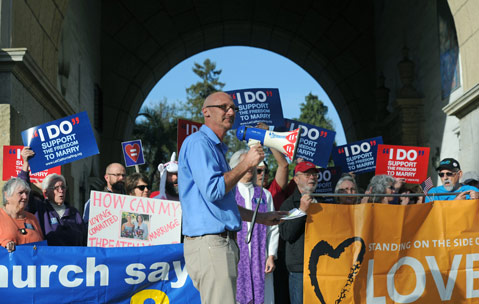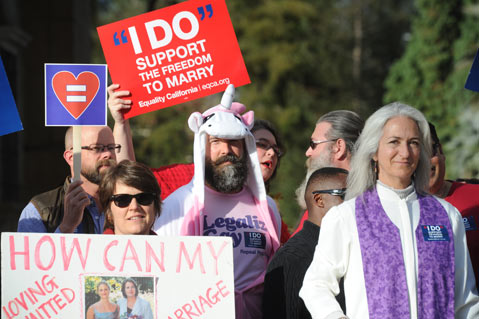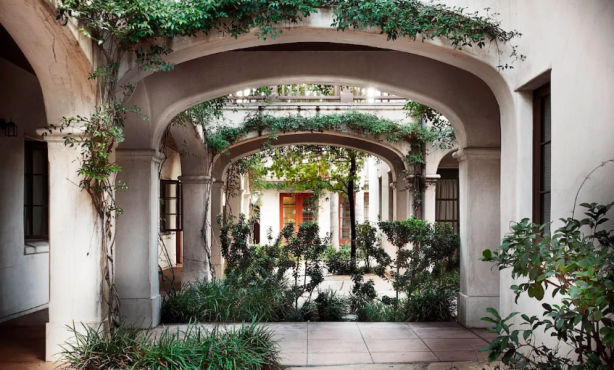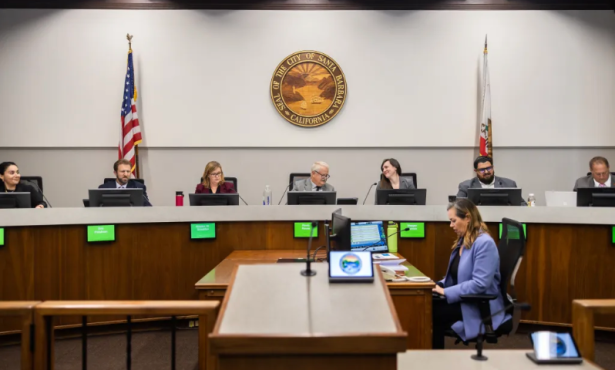Great Debate on Prop. 8
Supreme Court Takes Up Gay Marriage

Longtime Seattle resident Thomas Anastasi had been with his partner for 25 years when a 2004 ballot initiative to legalize gay marriage in Washington failed. The current minister of Live Oak Unitarian Universalist Church in Goleta, Anastasi “went into this really big funk” and stopped officiating marriages. Still with the same partner today, he said, “It would just thrill me to get married here and to marry people — all people.”
Whether that happens will depend on the Supreme Court, which, on Tuesday and Wednesday, heard oral arguments for and against two laws preventing gay marriage, including California’s Proposition 8. The voter-approved ballot initiative banned gay marriage in this state, throwing out a California Supreme Court ruling that overturned a similar 2000 ballot proposition.

With about 100 others, Anastasi attended a rally in support of gay marriage held at the Santa Barbara courthouse Tuesday evening. The rally was organized by the Pacific Pride Foundation and graced by dignitaries like Mayor Helene Schneider, Congressmember Lois Capps, State Senator Hannah-Beth Jackson, and County Supervisor Janet Wolf, who officiated gay marriage ceremonies for the 140 days they were legal in California. Wolf told attendees about the last marriage she performed. It was an emotional event, she said, when two men who worked at UCSB and had been together for 25 years called her at 3 p.m. the day before the Prop. 8 election because they wanted to make sure they got married while it was still possible. Like Anastasi, she said, “I want to get back into the marriage business.”
Since Prop. 8 passed with a 52-48 margin, said Schneider, government and religious officials have “quote evolved.” The public has, too, according to a CBS News poll conducted last week. It found that 53 percent of Americans support same-sex marriage and that Republican support has spiked from 13 to 37 percent since May 2012. Schneider squeezed in her visit to the rally during a recess of the weekly City Council meeting.
Marriage between a man and a woman, he said, has implications for, among other things, the survival of society and the successful rearing of children.
Councilmember Dale Francisco did not accompany her. He donated $200 to the Prop. 8 campaign when it was on the ballot in 2008. Pointing out that he was speaking as a private citizen and not a councilmember, Francisco told The Santa Barbara Independent that “civil unions already give every benefit of marriage,” and that “the people who want to redefine marriage are never satisfied.” Marriage between a man and a woman, he said, has implications for, among other things, the survival of society and the successful rearing of children.
The connection between marriage and procreation was a topic of debate during the Supreme Court hearing on Tuesday. On that very point, Justice Elena Kagan prodded Charles J. Cooper, lawyer for Protectmarriage.com, the group appealing a California Supreme Court decision that declared Prop. 8 unconstitutional in February 2012. “Suppose a state said that ‘because we think that the focus of marriage really should be on procreation, we are not going to give marriage licenses anymore to any couple where both people are over the age of 55,’” Kagan asked. “Would that be constitutional?”
Justice Kennedy, believed to be the swing vote on the nine-member Supreme Court, wondered whether the case should have been heard in the first place. “We have five years of information to weigh against 2,000 years of history or more,” he said. But he also noted the 40,000 children of same-sex couples in California whose voices should be heard.
“We don’t want separate but equal rights with domestic partnerships,” he added.
The two cases before the court encapsulate a “historic moment,” said David Selberg, executive director of the Pacific Pride Foundation. He said he preferred the court make a judgment on the merits of same-sex marriage as opposed to a technical legalistic decision. “We don’t want separate but equal rights with domestic partnerships,” he added. The City of Santa Barbara counts 633 registered domestic partnerships in its records.
Gina Arminia, a 20-year-old gay college student who attended the rally with a friend after they saw the Facebook invitation, did not feel the historic weight of the moment, noting that a ruling against same-sex marriage would merely be a “speed bump” because the concept is steadily gaining cultural currency anyway. She felt pretty confident that Prop. 8 would not be reenacted and questioned why Chief Justice Roberts would invite his gay cousin to the hearing if he was going to disappoint her. (According to the Los Angeles Times, the San Francisco woman, Jean Podrasky, solicited the tickets through Roberts’s sister, but the justice knows she will be sitting in a section reserved for his guests.)
One half of the first gay couple to be married in Santa Barbara County and the incoming principal at La Cuesta High School, Frann Wageneck spoke to the significance of the Supreme Court’s ruling on the Defense of Marriage Act, which denies federal benefits to same-sex partnerships. It was signed into law by President Clinton — who now says he opposes it — in 1996. Wageneck files joint state tax returns but must file individual federal returns. Her marriage is also not recognized in other states. Besides those practical concerns, however, she said that same-sex marriage is an issue of civil rights. “Being seen as an equal when you’re a hardworking American is important.”



